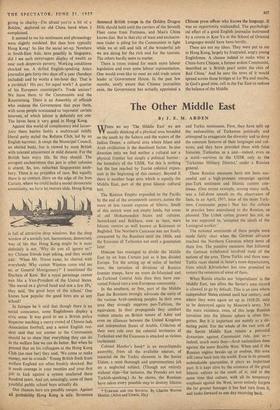The Other Middle East
By J. E. M. ARDEN WHEN we say 'The Middle East' we are usually thinking of a physical area bounded on the south by the Sahara and the waters of the Indian Ocean; a cultural area where Islam and Arab civilisation is the dominant factor. In one direction only we find neither a cultural nor a physical frontier but simply a political barrier : the boundary of the USSR. Yet this is nothing but the line reached by Tsarist colonial expan- sion at the beginning of this century. Beyond it there is another huge area which is equally the Middle East, part of the great Islamic cultural belt.
The Russian Empire expanded. to the Pacific by the end of the seventeenth century, across the more or less vacant expanse of Siberia. South of this stretch were not empty lands, but areas of old Mohammedan States and cultures. Samarkand and Bokhara, now as then, were Islamic centres as well known as Kairouan or Baghdad. The Northern Caucasus was not finally conquered by the Russians until the 1860s, and the Emirates of Turkestan not until a generation later.
Moscow has managed to divide the Middle East by an Iron Curtain just as it has divided Europe. Yet the setting up of miles of barbed wire, the intrusion of divisions of Russian frontier troops, have no more de-Islamised and de-Turkised Central Asia than they have con- verted Poland into a non-European community.
In the Southern, or free, part of the Middle East the Russians strongly advocate the unity of the various Arab-speaking peoples. In their own area they strongly suppress pan-Turkism, the equivalent. In their propaganda they conduct violent attacks on British tenure of Aden and even on alliances between the United Kingdom and independent States of Arabia. Criticism of their own rule over the colonial territories of Turkestan and the Caucasus is attacked as vicious incitement.
Colonel Hostler's book* is an encyclopaadic assembly, from all the available sources, of material on the Turkic elements in the Soviet Union, a most thorough and unprententious job on a neglected subject. (Though not entirely without slips—for instance, the Pomaks are not Turkish-speaking.) As he shows, the Russians have taken every possible step to destroy Islamic * TURK ISM AND THE SOVIETS. By Charles Warren Hostler. (Allen and Unwin, 30s.) and Turkic sentiments. First, they have split up the nationalities of Turkestan politically and attempted to exaggerate the diversity and to deny the common features of their languages and cul- tures; and they have provided them with false histories. Turkestan as a unit—indeed, even as a word—survives in the USSR only in the 'Turkestan Military District,' under a Russian general.
These Russian measures have not been suc- cessful and a high-pressure campaign against pan-Turk sentiment and Islamic custom con- tinues. (One recent example, among many such, was a full-dress assault on the observance of fasts, in an April, 1957, issue of the main Turk- men Communist paper.) Nor has the culture in practice been assimilated to the Russian, as planned. The Uzbek cotton grower has not, as he was supposed to, 'accepted the ideals of the Leningrad worker.'
The national sentiments of these people were made fairly clear when the German advance reached the Northern Caucasus where some of them live. The punitive measures that followed the German withdrawal involved most of the nations of the area. Three Turkic and three non- Turkic races shared in Serov's mass deportations, from which Khrushchcv has now promised to restore the remnants of some of them.
When Russia attacks our 'imperialisms' in the Middle East, too often the Soviet's own record is allowed to go by default. This is an area where independent States existed until last century, and where they were again set up in 1918-20, only to be destroyed Again by Moscow's army. Yet the mere existence, even, of this large Russian intrusion into the Islamic sphere is often for- gotten. But it is important not merely as a de- bating point. For the whole of the vast area of the Soviet Middle East retains a potential dynamism against Communist rule, just as— indeed, much more than—Arab nationalism does against the more flexible West. When and if the Russian regime breaks up or evolves, this area will come back into the world. Even in its present unbreakable quarantine, it plays an important part. It is kept alive by the existence of the great Islamic culture to the south of it; and at the same time that culture, with all its temporary emphasis against the West, never entirely forgets the far greater hostages it has had torn from it, and looks forward to one day receiving back.


































 Previous page
Previous page